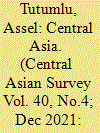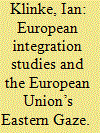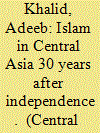| Srl | Item |
| 1 |
ID:
181818


|
|
|
|
|
| Summary/Abstract |
This article answers the question of why Central Asia studies has not contributed more fully to the study of comparative politics since the collapse of the Soviet Union. It argues that during the Soviet period, Central Asia remained a dark matter to Western scholars specializing in Sovietology and who lacked access to the region. Although in the 1990s Western academics saw the ‘light at the end of the tunnel’, expecting Central Asia to join the liberal world order, these hopes declined after the 2000s when not only the transition paradigm failed, but also because a consolidated form of authoritarianism closed access to the field. In conclusion, this article offers the most promising fields for the development of the study of comparative politics across and inside Central Asia.
|
|
|
|
|
|
|
|
|
|
|
|
|
|
|
|
| 2 |
ID:
141204


|
|
|
|
|
| Summary/Abstract |
European integration studies has recently seen the first signs of a belated critical turn. While new approaches have started to challenge the way the European Union is conventionally studied, they are yet to investigate in detail the relationship between the academic field and its primary object of study. This article draws on work in critical geopolitics to explore one of the interfaces of academic knowledge on European integration and the world of policy: the Jean Monnet Programme. In highlighting the scheme’s role in the EU’s Eastern geopolitics, it argues that European integration studies resembles other forms of area studies, such as cold war era Sovietology. This comparison elucidates both the field’s long-standing resilience to critical theory and its inability to anticipate the recent crisis of the European project.
|
|
|
|
|
|
|
|
|
|
|
|
|
|
|
|
| 3 |
ID:
181820


|
|
|
|
|
| Summary/Abstract |
The study of Islam in Central Asia has undergone enormous transformations in the 30 years since the Soviet era came to an end. Over the last three decades, a sizable corpus of literature on Islam in Central Asia has appeared across several disciplines. There has also been considerable debate over methods and approach: What questions are important to ask? Which kinds of sources are the most significant? Which voices from among Central Asians are the most important? This study has two main aims. First, it provides an overview of the various literatures on Islam in Central Asia, with a sense of their trajectories in the three decades since the dissolution of the Soviet Union. Second, and more importantly, it offers a critique of the critique mentioned above. The study does so by examining the ideological and methodological assumptions that underpin it and by articulating the stakes involved, a task that has not yet been undertaken.
|
|
|
|
|
|
|
|
|
|
|
|
|
|
|
|
| 4 |
ID:
181819


|
|
|
|
|
| Summary/Abstract |
Recalling knowledge and instruction about Central Asia toward the end of the Cold War (1945–91) in the United States, this article provides a retrospective on an anthropologist’s coming of age and ability amidst prevailing interests and convictions concerning the region. It continues to discuss some of the early topics and studies that initiated a grounded approach to understanding Central Asia ethnographically as it broadens the analysis via a consideration of contributions from Europe and Central Eurasia. Not a literature review per se, the article focuses on some major concerns among anthropologists and their subjects since the beginning of independence. It then concludes that while studies have developed in complexity and theory within our field, we continue writing about culture via overarching political and economic systems that inform how we apprehend the world. The multiple and overlapping identities of Central Asians will continue to occupy much of our academic thinking for years to come.
|
|
|
|
|
|
|
|
|
|
|
|
|
|
|
|